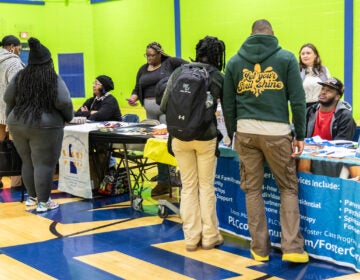Chef Tyler Akin brings French brasserie to Wilmington’s Hotel DuPont Sept. 1
Coronavirus stay-at-home orders brought Le Cavalier’s debut to a halt. Delaware restaurants can do business now, but opening will still bring challenges.
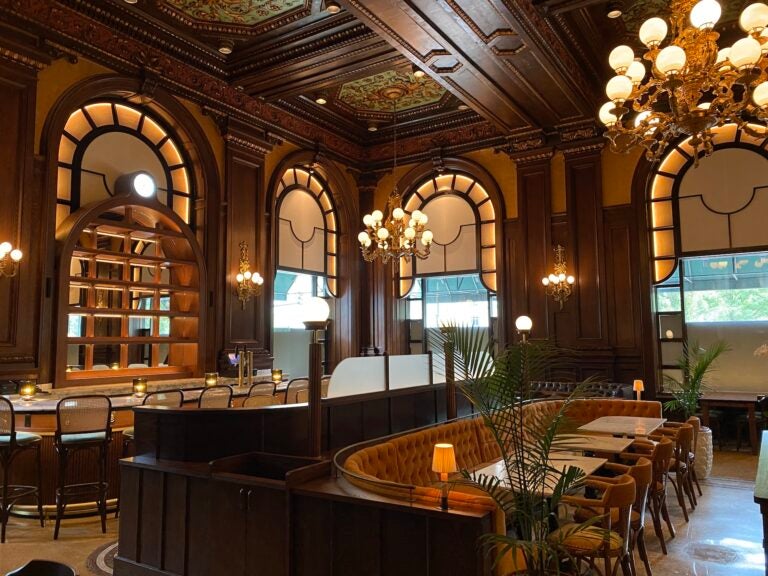
Le Cavalier was set to open in April, but coronavirus pandemic stay-at-home orders postponed its reopening. (Courtesy of Le Cavalier)
Are you on the front lines of the coronavirus? Help us report on the pandemic.
During the winter, chef Tyler Akin was preparing for the April opening of his new restaurant, Le Cavalier, at the Hotel DuPont in Wilmington.
But a month prior to the opening date, coronavirus pandemic stay-at-home orders halted preparations for the new French brasserie that would replace the historic Green Room restaurant.
“It was terror,” Akin said with a laugh.
“We persevered through every kind of facilities challenge you could imagine, whether it was major utilities work outside of various locations, like water main breaks, or things within the space that broke down and compromised our ability to do business.”
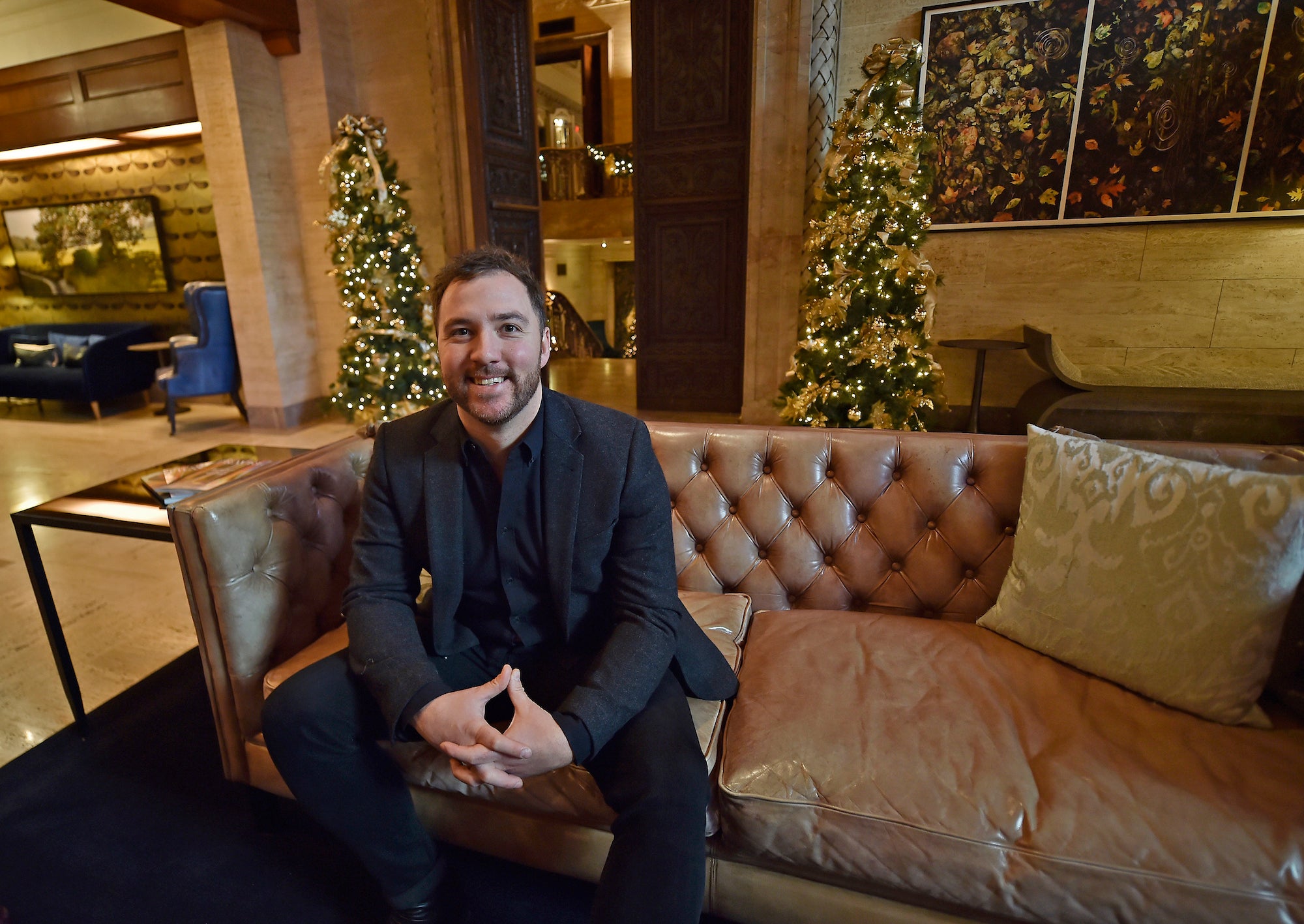
Back in early March, Akin, chef-owner at Philadelphia’s Stock and Res Ipsa Cafe, was invited to meet with restaurateurs and Philadelphia officials at Zahav to discuss the outlook for area restaurants. He said the atmosphere in the restaurant was “surreal.”
“There had never been occasion for that to happen, and we were all trying to make sense of the guidance coming out,” Akin said.
“It was confusion, a sense of urgency to keep our teams safe. We didn’t know what the scope of the challenge was, what the duration of closures may be, or operating restrictions. I think most of us were thinking, looking across the pond to Europe, thinking we would close for two or four weeks, and maybe come back with masks or outdoor dining and all would be OK. And, obviously, it became a much more protracted situation than that.”
Then, it was a waiting game.
For several weeks, Akin’s team faced delays with items being shipped from Europe, and a delay in work by subcontractors and fabricators.
But in an interview this week, Akin announced Sept. 1 as the new opening date. Le Cavalier at the Hotel du Pont has replaced the Green Room, a historic restaurant that had been the social focal point of the city since the hotel’s opening in 1913.
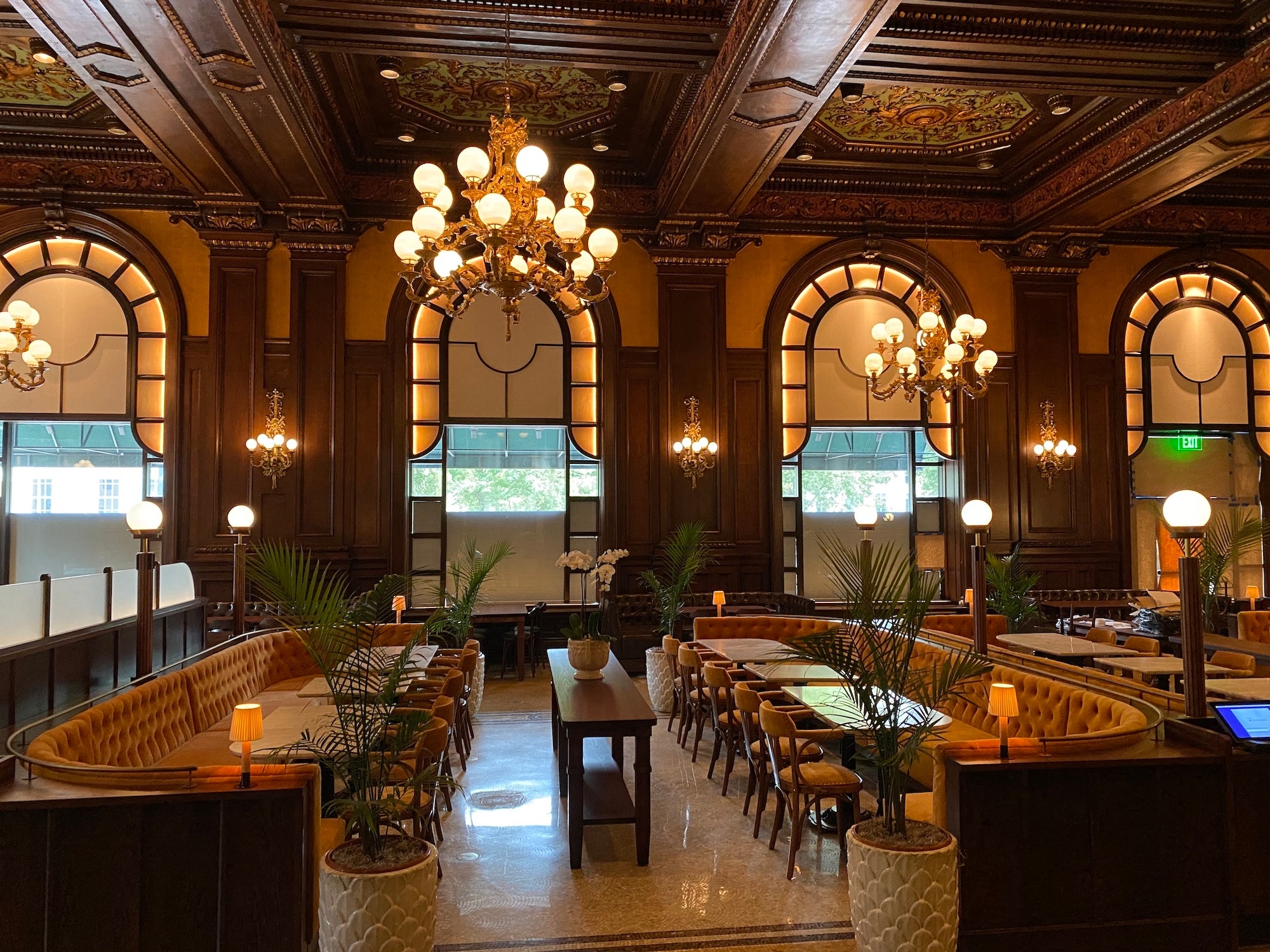
Delaware restaurants have been allowed to offer indoor dining since June, and are currently limited to 60% capacity of fire code occupancy limits. Akin said there will be challenges that go along with opening a new business in the midst of a pandemic.
“There’s the obvious and immediate health and psychological challenges revolving around our prospective guests and whether they feel safe eating out, whether they feel safe eating indoors versus outdoors. I know that’s a case-by-case decision for everybody. I do know there are restaurants in Wilmington and beyond that have been making a go of indoor dining since early June with varying success,” Akin said.
The Hotel DuPont and the restaurant formerly known as the Green Room had previously relied on bookings at the hotel, the Playhouse on Rodney Square (often referred to as the DuPont Theater), and those who work in Wilmington’s downtown businesses and courthouses. Today, many employees continue to work from home, and there are no shows scheduled at the theater.
But Akin said one of his goals for Le Cavalier has always been to attract the general community to the dining room, “… to make it less of a hotel amenity, and more of a community restaurant, somewhere that people would feel comfortable going with regularity, as opposed to once a year for a special occasion.”
During the early days, the pandemic’s impact on downtown Wilmington was substantial, said Dave Pollin, co-founder and president of the Buccini/Pollin Group, which bought Hotel DuPont in 2017, and chairman of PM Hotel Group.
But Pollin said the trajectory for the city is positive, noting that his real estate acquisition, development and management company has found that leasing in Wilmington has remained strong during the pandemic, which is driving restaurant and bar activity.
City initiatives have also helped Wilmington restaurants survive, Pollin said. “Curbside Wilmington,” for example, allowed downtown restaurants to expand outdoor dining into former parking spaces directly in front of their businesses.
Still, the major legal and financial institutions in the city must return work to the office for businesses to continue to be successful, he said.
“If they want the restaurants and the other amenities to be there for them when they come back, they need to come back now,” Pollin said.
“Le Cav cannot be sustainable long-term without the business community supporting us,” he said. “They told us they wanted us there, they said that they would be important stakeholders, and [wanted] something new and special being introduced to Wilmington. So, we’re counting on them, and they can’t stay at home doing Zoom calls and think their community is going to be waiting for them and be healthy — because it won’t. If they say, ‘We won’t be back to the office until July of 2021,’ well, there won’t be a community to come back to.”
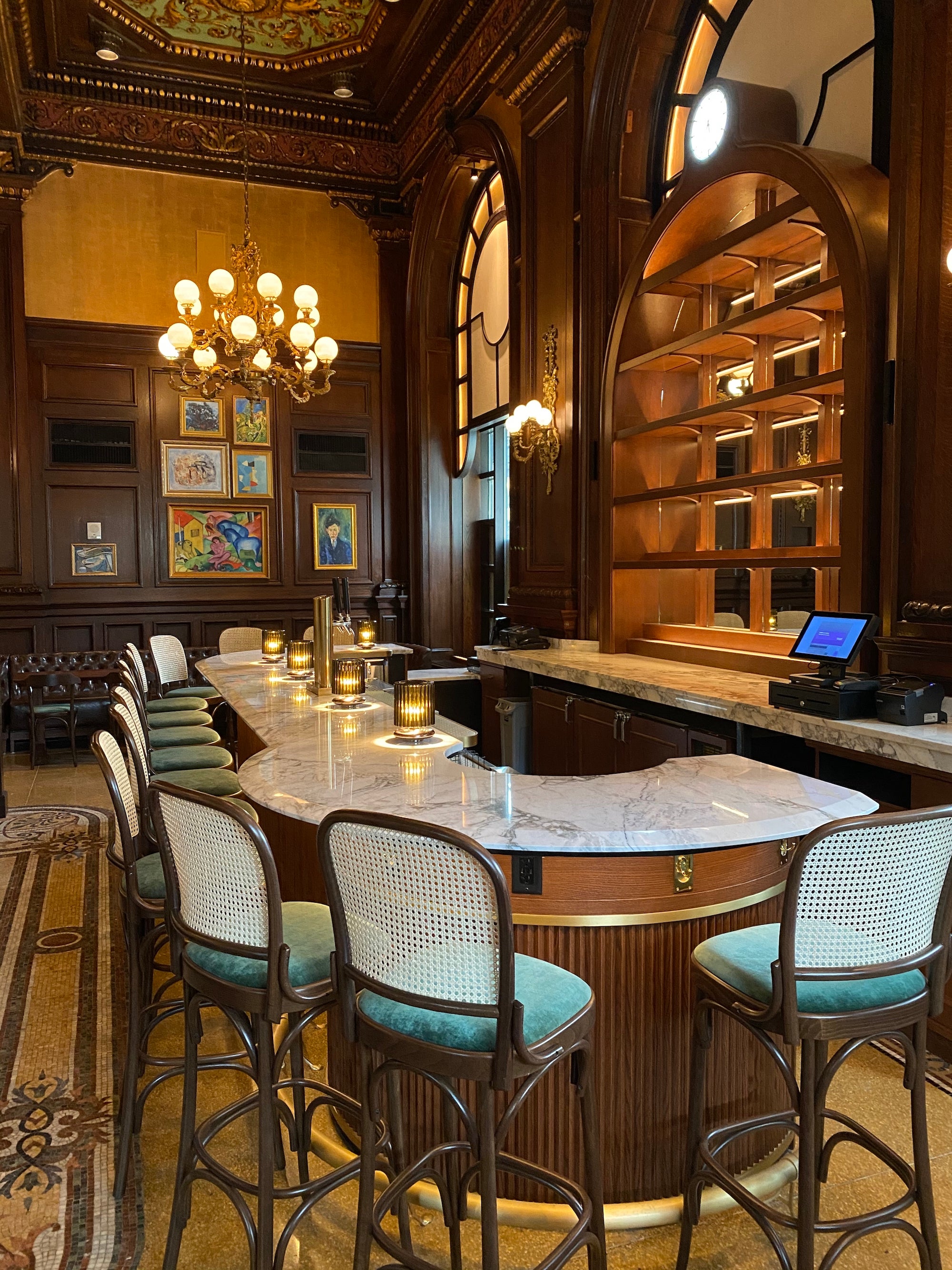
The most significant pivot Le Cavalier will make is meeting a lessened demand for dining out caused by the pandemic. Previously, the French brasserie was set to serve breakfast, lunch and dinner during the week, and brunch and dinner on the weekends. Because of the pandemic, the restaurant will serve dinner only Tuesday through Saturday.
The hotel, which is one of the drivers for breakfast, is open and operating, but at much lower occupancy than it would traditionally have, Pollin said. Though members of the community typically go to restaurants for dinner, people who work in the city, and hotel guests, dine at breakfast and lunchtime. Once Wilmington businesses are open, Pollin said, the dining hours will increase — creating about 70 new jobs.
Le Cavalier will offer takeout with its complete à la carte menu, and provide outdoor dining overlooking Rodney Square. The restaurant also is working to get approval from the city to extend the outdoor dining space farther down Market Street to allow for a total of 40 seats.
Akin’s menu is inspired by Provence and North Africa, pulling references from Akin’s own career, from his time studying French cuisine in culinary school, to working at Philadelphia’s Israeli restaurant Zahav and creating Italian fare at Res Ipsa.
North African elements can be tasted in dishes like the trout amandine with almond, Tunisian eggplant and espelette, or the branzino with blistered herbs, harissa and pistachio dukkah.
“I think that communication culinarily between France and North Africa is intriguing to me, because I have a background cooking with those flavors. My time at Zahav, they pull from the entire Jewish diaspora, which includes places like Morocco and Tunisia, so I felt confident that I knew how to work with those flavors,” Akin said.
“And I think the really cool thing about representing that in a brasserie context is that influence flows both ways. You can look at Tunisian food in Tunisia or Moroccan food in Morocco, and see the French influence, and likewise, you can find amazing Moroccan and Tunisian food in Paris today, and see chefs working in these modern bistros who are incorporating that language into their own food as well. I just think it’s a really cool reciprocal dialogue we wanted to explore.”
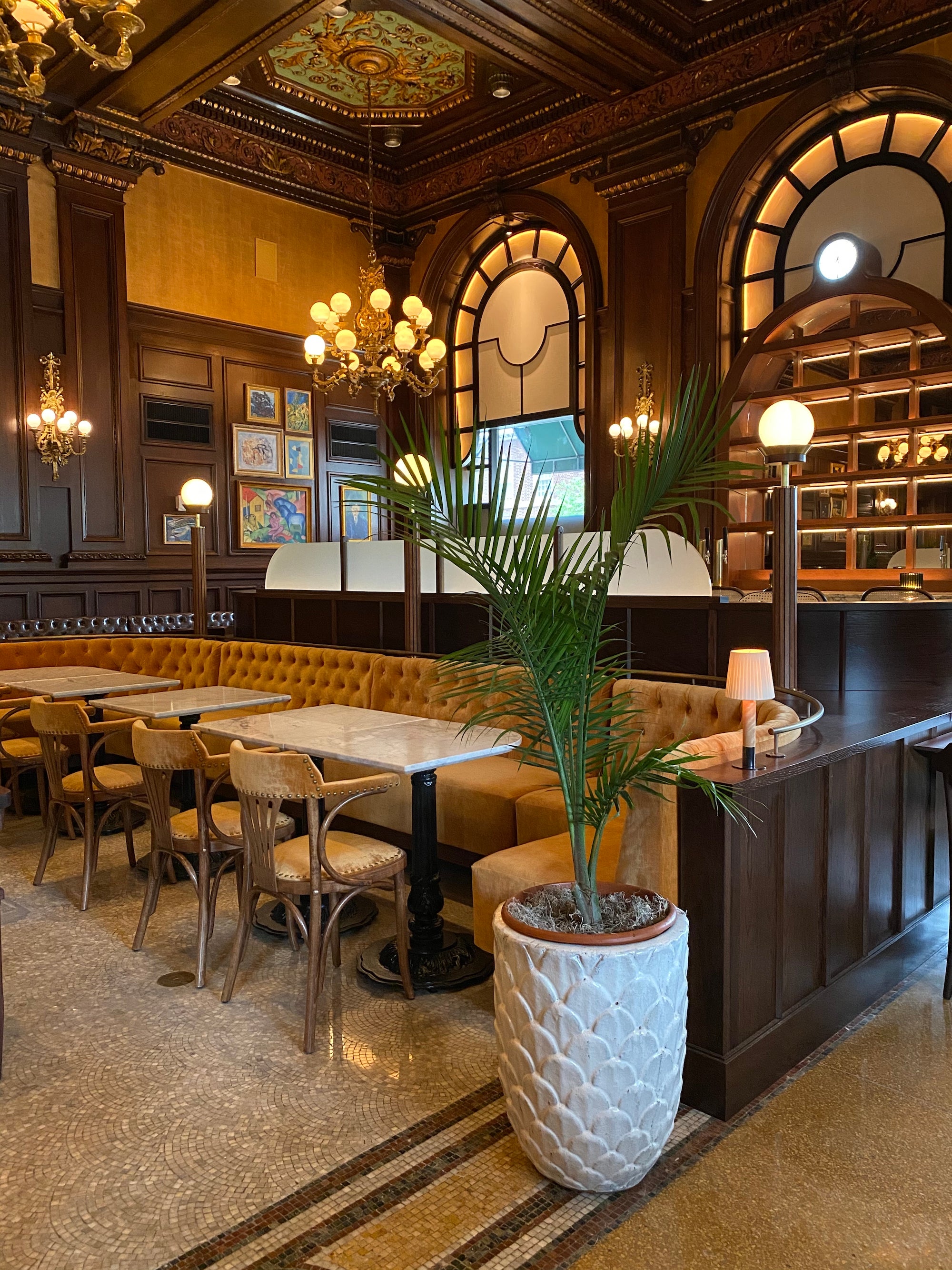
Vegetarian options include the campanelle pistou with basil pesto, roasted tomato, pine nuts and preserved lemon, and the romanesco with ratatouille and saffron pilaf.
Akin said he’s also very proud of the cheeseburger with dijonnaise, which he calls a “fun version of the classic American burger.”
The chef wanted to elevate the former Green Room, known for its formal dining experience, to a fresh new era. Akin previously described his upcoming restaurant as “approachable, but elevated,” with a goal to attract customers interested in a casual dining experience. Unlike the Green Room, diners don’t have to make reservations or wear formal attire.
“The fine-dining perception has been associated with the Green Room since forever. We want to shed that reputation, and we’ve taken all the steps we can, short of pulling down the wood paneling and chandeliers, which we never would have done,” Akin said.
“In terms of dress code, music, style of service, even what our own team is wearing on the floor, we’re doing everything we can to make this a casual restaurant. The food is thoughtful, and creative, and well-executed, but I think the fine dining attribution is in the past of that dining room.”
While creating the concept for Le Cavalier, Akin and his team spent days researching the Hotel DuPont’s archives at Hagley Museum — where Akin interned during law school. They looked at old menus and photos to learn how the Green Room evolved over the years. Akin said it inspired him to bring elements of the restaurant’s roots into Le Cavalier.
“What we learned along the way was there was never a static Green Room concept or identity,” he said.
“There was a period in the ’80s and ’90s when there was a big influence of classical Swiss management and culinary talent. There was a time in the ’80s where there was an incredible exchange program with sushi chefs from Kyoto, where the Green Room is serving sushi before any other market in America. And then the more casual stuff in the ’60s, they were doing luau dinners. So this perception that the Green Room was always a stuffy, overly formal thing — it actually wasn’t that way all along.”
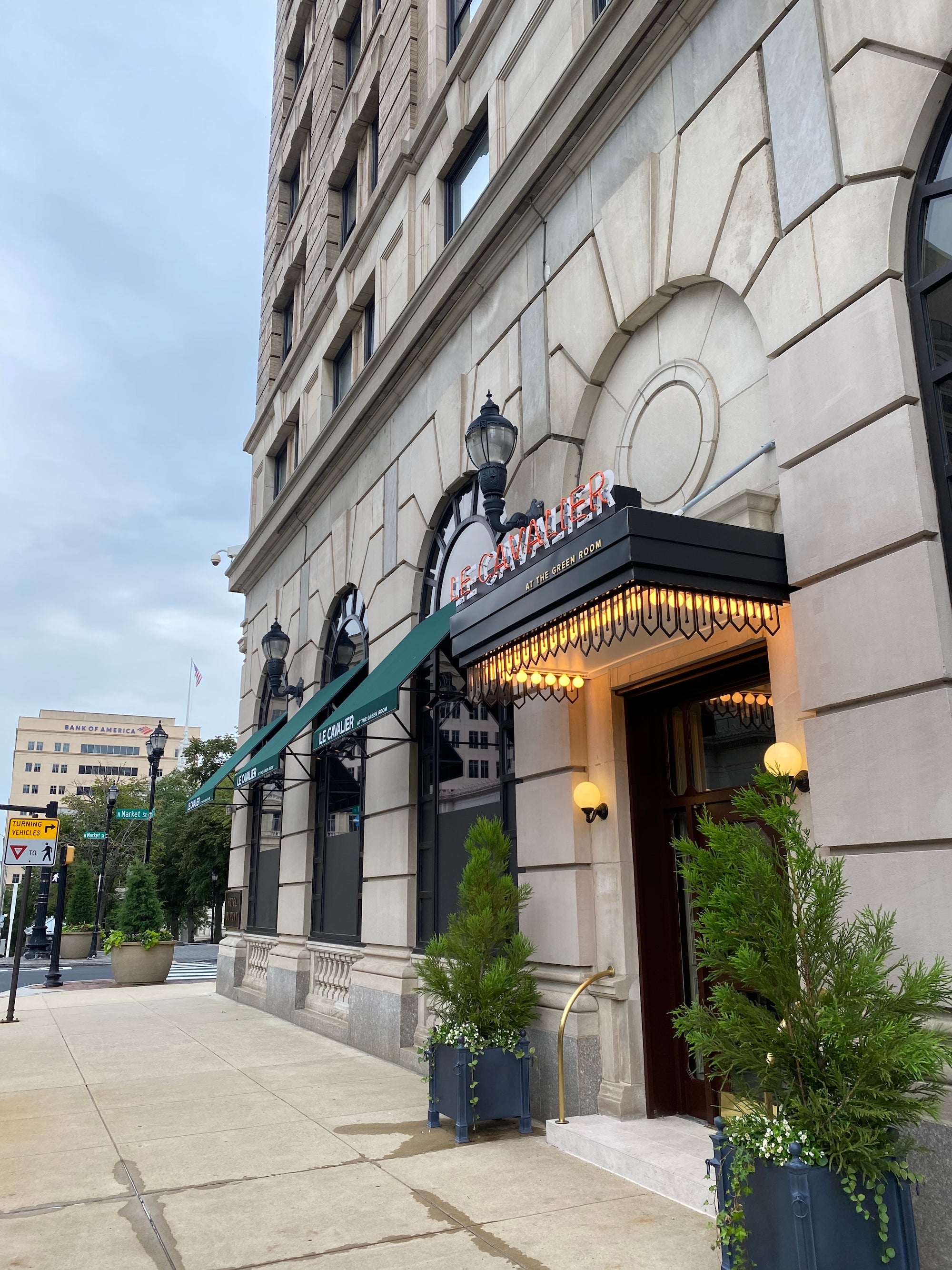
The new dining room is designed with a banquette layout, features a bar, and displays 20th-century France-inspired artwork. Akin described some elements of the former Green Room, such as the ceiling art, the fumed oakwood paneling and the Spanish chandeliers as “timeless” and “priceless” pieces that make the space one-of-a-kind.
“Those things are irreplaceable, and it would be hard to create a dining room like this in 2020 with all the money in the world,” he said.
Akin is most excited about the floor discovered underneath wall-to-wall carpeting that had been there for decades. There was no photographic evidence of what was below the carpet, so when it was pulled up, Akin and his team got a pleasant surprise.
“It would be hard to commission something like that, just for a lack of craftsmanship in 2020,” he said.
Though he is proud of the distinguished menu and atmosphere he has created at Le Cavalier, Akin encourages the community to help all local businesses as much as they can during a difficult time.
“Knowing on the one hand that people are hard-pressed right now and there’s a lot of financial uncertainty, to the extent people can spend money and support restaurants, and directly support restaurants, if you can make your purchases directly as opposed to through a delivery partner that takes 30% of the transaction,” Akin said. “If you can support small business, restaurants, especially those that are cornerstones of our community. It’s not unthinkable that many of them will disappear in the next several months.”

Get daily updates from WHYY News!
WHYY is your source for fact-based, in-depth journalism and information. As a nonprofit organization, we rely on financial support from readers like you. Please give today.



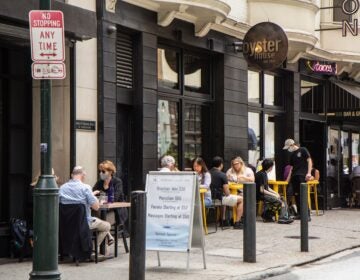
![CoronavirusPandemic_1024x512[1]](https://whyy.org/wp-content/uploads/2020/03/CoronavirusPandemic_1024x5121-300x150.jpg)

